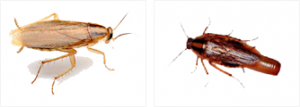Cockroaches

Cockroach Damage and Health Implications
The presence of cockroaches is often detected by their damage or by the fecal matter, called frass, the deposit. The most important aspect of cockroach damage is a result of their habit of feeding and harboring in damp and unsanitary places, such as sewers, garbage disposals, and damp and unsanitary areas of kitchens, bathrooms, and storage areas indoors. Filth and germs from these sources are spread by the cockroaches onto food supplies, food preparation surfaces, dishes, utensils, and other surfaces. Cockroaches contaminate far more food than they eat. Diseases transmitted as a result of these habits include various forms of food poisoning or gastroenteritis. These same habits, along with the smell imparted by any significant level of infestation, are why people are so disgusted and repulsed by the mere presence of cockroaches.
Cockroaches also carry a wide variety of protozoa and other microorganisms inside their bodies, some of which may occasionally be involved in the spread of disease o humans. Cockroaches excrement and cast skins also contain a number of allergens to which many people exhibit allergic responses, such as skin rashes, watery eyes, and sneezing. For some very allergic people, and particularly for those who also have a chronic lung disease such as asthma, allergic attacks to cockroach allergens can be very serious and even life threatening.

German Cockroach
In homes, German cockroaches are most commonly found in kitchens, other areas of food storage or consumption, and bathrooms. (Shuster and Provonsha). The German cockroach is the only common house infesting species that carries the egg capsule for an extended period. Capsules removed from the female more than a couple of days before the normal hatching time will be less likely to hatch unless they remain under conditions of high humidity.
German cockroaches is a moderately to heavily infested apartment can move into or out of the kitchen area within a week’s time. Adult males appear to be the most mobile stage, followed by nongravid adults females.
Facts: German cockroaches can survive for up to one month without food and two weeks without water .


